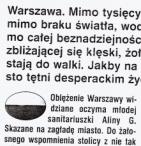| Original Contents (English Translation) | Bleeding motherland
Warsaw. In spite of thousands of bombs falling, shortage of electricity, water and staples, in spite of hopelessness of the situation and inevitable defeat, soldiers and civilians alike stand up for fight. As if out of spite to the invader, the city is teeming with a desperate life.
The siege of Warsaw seen through the eyes of Alina G. a young army nurse. A city doomed to destruction. A poignant memory from the capital in times of peace and helplessness in the face of suffering are reinforced by bereavement
21 September. Things are desperate. Everything is running low. Shelling is so heavy that we are forced to wind up our room where shrapnel hit twice, and we move up all the medicine to the lift. Every now and then someone comes over. Everybody is seeking comfort. Uncertain eyes cling on to our mouth greedily absorbing words of comfort. I find it all very hard. What can I say to all those who want to live, who want to come back to their wives and children, while I have lost faith in deliverance myself. But we do our best to convince them everything’s all right, that it’s all as it should be. They leave reassured, coming back to give us sweets or a bottle of wine in return. We ask instantly, “Isn’t it stolen”? ”No”, they reply beamingly. I’m not sure myself, as many of them do steal. Not much, but anyway, they will snatch a bar of chocolate or some sugar… “Someone else is going to take it anyway”, they explain. It’s hard to fight it.
24 September. The sick, injured, dressings… Still less bread. The lovely chief of the battalion does his best to nourish us. The shelling is building up force. A strange night comes. I can’t get any sleep. Anxiety has me walking round the room. The sound of guards’ footsteps are reverberating in front of the house. All of Mokotow quarter is a fortress. Barricades follow barricades, and trenches in the Niepodleglosci avenue.
25 September. Christ, what’s going on! Now is the real living hell. The whole edifice is shaking all the time. We don’t get down to the shelter, though. Tough luck. I’d rather die looking at the sky than get buried by rubble. The streets are empty. Still, I want to go to my mother. What’s happening to them now? They firmly prevent me from going, though. A while ago a shell hit into one of the rooms, pierced through two walls and smashed the desk. A cloud of dust gets in our eyes. Glass is falling everywhere there’s nowhere to sit or rest your head on.
We have dinner in the basement. A bomb explodes in the courtyard. Apparently a small calibre, as there’s a terrible crater mocking you, while the wounded house is shaking to the foundations. Planes galore. One could think the world is falling down.
26 September. I’m going to my mother. ”Put on a helmet”, Vera advises, “That’s at least a bit of protection“. I walk into the empty street. First, second, third… my heart misses a beat. The whole city’s a wreckage. Piles of hot debris, clouds of dust. Tears are falling from my eyes. Warsaw – beautiful, beloved city – where are you?
War as seen from Brazil.
On 12 October 1939, Tadeusz Skowronski, Polish ambassador in Brazil, through Oswaldo Aranha, Minister of Foreign Affairs, received the first letter from his mother in Warsaw.
My beloved! No pen or even the most vivid imagination can express what we have endured. It appears that the will to live is stronger than anything else, witness the fact that we are alive and well. We are only suffering spiritually from what has happened and what lies ahead of us. And now let me describe everything as it happened. On 25 August I set out with children from Torzeniec to Czestochowa […] and within two days Kazio’s family turned up, who, having loaded everything they could into their car, reached their destination travelling on side roads […] and after a couple of days of installing themselves there, took the opportunity and went back to fetch their children. They finally trudged here and are staying together, without a chance of returning to Gdynia, as only those who have lived there since 1918 have the right to stay. […] And now a few words about the estate and the house. The gardener and eight farm workers escaped on bicycles and came up to me, telling me that as soon as on the 30th at 10 in the morning, Kepno and Torzeniec estate were both seized and that there were several hundred cows in the farmyard, herded up from the neighbourhood, and that tractors were taken too, but they were left on the road because there was no fuel, and that crowds of refugees blocked traffic – all things said, a terrible mess. […]
Our house in Warsaw, in the Napoleon square, has survived miraculously, as there were only charred ruins around, it was hit by several shells that tore up its roof, on the corner on the square and Warecka street side. All the windowpanes are shattered, even the double ones, with windows lying on the stairs, ripped out along with fragments of the wall, the roof riddled with holes – it’s going to cost a lot, but at least, one can live there. The power station was the first to break down, followed by waterworks – you still need to walk to the Vistula river to get water, having to ration portions for washing. The 25th of September should be written in chronicles. Hurricane fire coming nearly every second (with short breaks), whiz of aircrafts and bombs falling, smoke coming from burning houses, panic of people, who bewildered with terror ran in different directions, dressed in just their underwear. They were dropping dead like flies, I wonder how many were killed then. God only knows. One can say Warsaw is ruined in 70 per cent. The cathedral, Castle, Concert hall, Pac Palace, railway station, ministry of foreign affairs and Marszalkowska street – to put it short, a complete and utter ruin. Villages are burned too. Maybe our great-grandchildren will manage to rebuild it all, as our grandchildren won’t have enough time. We haven’t slept for ten nights, we haven’t had anything warm to eat for five days, and we’ve had 14 refugees in our hose because, I forgot to add, living in Kazio’s house became impossible. In return for Kazio’s car which they had appropriated, Polish army moved me along with the furniture, in gunfire on the bridge, to my old accommodation, only to find it full of people on my arrival there. One had to think how to feed the lot, with a lack of everything, with shops locked because of no windows there, completely robbed; with warehouses burnt, so one could only buy something at a price of gold. Now it’s better, though. Kazio’s family brought all they could, so we managed to ward off prospect of hunger for a while, but if it’s to last, things will get worse next year. Tenants are not paying, you cannot take money out from the bank. Kazio’s family are on the verge of ruin, as houses there are used as refugee accommodation. I am troubled by your situation and your moral breakdown over your country’s prestige as well as by the education of children – if it is to last, I believe you should take them to Switzerland, so that they can learn there, especially Roman, otherwise he will get demoralized, and these days education is their only capital. In any case, don’t send me any money. May all of you remain in good health and in good hope. Although after all that happened it’s hard to be of good hope. I would to God that will we would see each other again, and now I entrust you to God’s care. Our square is full of graves and crosses. The Janicki family died in the rubble, Zosia Komorowska’s husband, Wieniawski was killed, there is a sense of overall bitterness over what has happened, creating a favourable atmosphere for a spread of bolshevism – we’ve been lied to in a horrible way. We owe our gratitude to the deliverer of this letter who visited us.
Zofia Skowroñska
|

